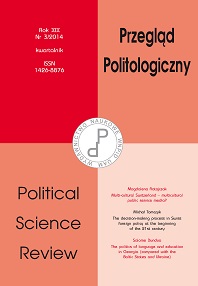The specificity of the electoral system to the European Parliament in the Republic of Austria
The specificity of the electoral system to the European Parliament in the Republic of Austria
Author(s): Artur Olechno, Kamila M. Bezubik Subject(s): Politics / Political Sciences
Published by: Uniwersytet im. Adama Mickiewicza w Poznaniu
Keywords: Austria; election; European Parliament; elections statute; electoral rights
Summary/Abstract: On 1 February, 1994 the Republic of Austria concluded the Accession Treaty and on 1 January, 1995 became a full member of the European Union. Membership obliged Austrians to ‘provide’ the Community with appropriate personnel to take up different posts in various EU authorities, as well as in the European Parliament. The most important issue was to alter particular statutory regulations and the Austrian Constitution to adjust to the new situation. The paper aims at presenting the Austrian solutions in this matter in the context of European Union law, with particular emphasis on regulations which are uncommon or specific to the Republic of Austria. The matter of interest is the constitutional practice of EU member states and the reader’s perspective is taken into account. The latter approach not only evaluates the Austrian solutions in the context of the electoral law to the European Parliament contained in the Election Code, but could also suggest some ideas in regard to prospective amendments. The authors would, in particular, like to pay attention to two issues: the lowering of the voting age, and the single constituency electoral system. The Austrian solutions might be valuable to refer to in the countries where a system of correspondence voting is just being introduced. These resolutions are particularly interesting taking into consideration prospective, possible amendments to the electoral laws of the EU member states.
Journal: Przegląd Politologiczny
- Issue Year: 2014
- Issue No: 3
- Page Range: 95-106
- Page Count: 12

